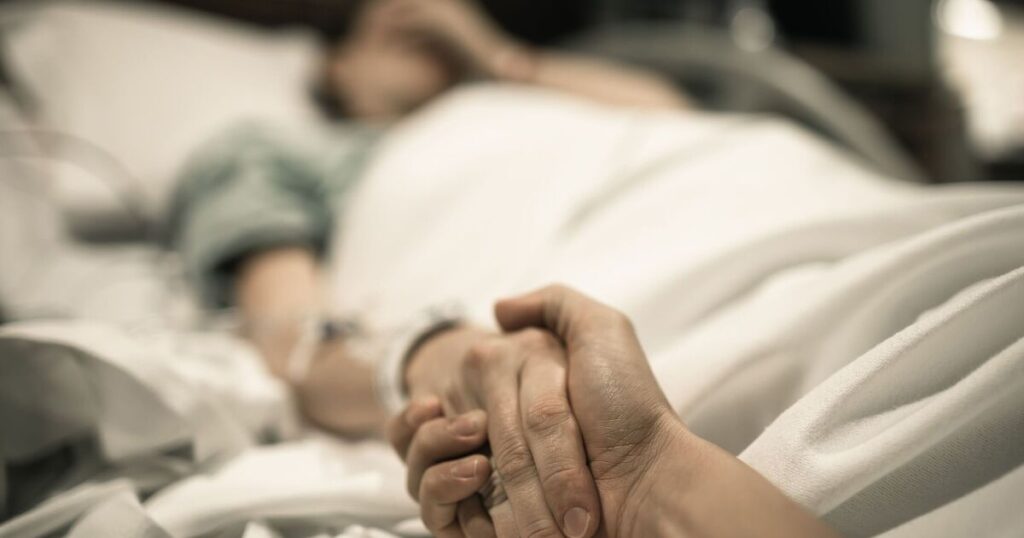
It’s not uncommon for terminal patients to appear to get better just shortly before they pass away at the end of long treatments.
It’s a glimmer of hope for their loved ones, who see a moment of lucidity and health – often interpreting the lapse as a sign of recovery.
The psychologically taxing phenomenon is one of the most bizarre and heartbreaking symptoms of death, explains nurse Julie McFadden from Los Angeles in a YouTube video.
The expert, who has a following of 600,000 on the video platform, released a 10-minute-long video essay about the six wildest deathbed behaviours she’s witnessed in her lengthy career in end-of-life care – her specialist area, about which she’s even published a book.
The 41-year-old starts the video by explaining what she calls terminal lucidity, something she found “really hard to believe actually happened”.
“You may know this as the rally or the surge,” she began. “This happens when suddenly someone who looks very ill will suddenly get a burst of energy and look like they’re getting better. What is it? We don’t know what it is. We do not know why.”
“There are theories as to why. Some people say there’s a burst of cortisol and that’s why they perk up. Maybe it’s hormones. We don’t really know why, but there are theories as to why this is happening, as it happens very often. About one in three of all of our patients will have terminal lucidity.”
Terminal lucidity, often only noticed in hindsight, can deeply affect the patient’s family and friends, who Nurse Julie says should be educated about the possibility of it happening.
“If you are with a loved one who looked like they were going downhill and suddenly are having a really great day, you’ll be able to know that maybe this is terminal lucidity and just know to enjoy it. Enjoy it and expect that maybe they will die soon after because that’s the kicker with terminal lucidity.”
How the behaviour works is the strangest part, Julie explained: “They’re suddenly hungry. They’re suddenly able to walk again. They’re suddenly very alert and oriented. Then shortly after, usually a day or two, they will die.”
Of course, she says, not every surge of health is terminal lucidity: “If your loved one does look like they’re going downhill and then suddenly they get better, but then they’re better for weeks on end, that is not terminal lucidity.”
In addition to that, Nurse Julie listed other weird occurrences common to people who end up dying soon.
One is visioning, when patients have hallucinations before passing: “It’s wild. I have seen so many people have delirium, have hallucinations, ICU psychosis, but visioning is different. It’s always comforting and the person can be up and having normal conversations, sitting in a chair, talking to their family and saying they’re seeing their dead father standing in the corner who is smiling and telling him he’s coming to get him soon and not to worry.”
She said she wouldn’t believe it if it wasn’t something she’s seen happen multiple times.
Choosing when to die is another common one: “I’ve seen people say ‘Tonight’s when I’m going to die I know it, I can feel it,’ and they do,” she explained, detailing how some people wait to be surrounded by family and friends to die, while others deliberately wait until after their loved ones have left the room.
Some even wait until special dates like a birthday or wedding have passed—“almost [like they’re] kept alive just because they want to get to that date”.
The death reach—“when the person’s lying in bed and they reach up in the air like they’re seeing someone or they’re reaching for someone either to hug them or to shake their hands. A lot of times they’ll hold their hands up for a long time”—and the death stare—“staring off into the corner or the side of the room basically looking at something intently”—often go together.
And finally, the behaviour she calls the “most impactful” is the shared death experience—or when someone who is not dying feels, sees or understands what the patient is going through.
“It’s kind of like the dying person gives you the sensation of what they’re going through. There may have been some times where that’s not a good thing, but from my experience and all the stories I’ve heard it’s usually a good feeling,” she added.
“It was like the person was giving me these feelings of freedom and joy and kind of telling me that they were okay and basically they couldn’t believe how amazing it was again.”
 Latest World Breaking News Online News Portal
Latest World Breaking News Online News Portal






